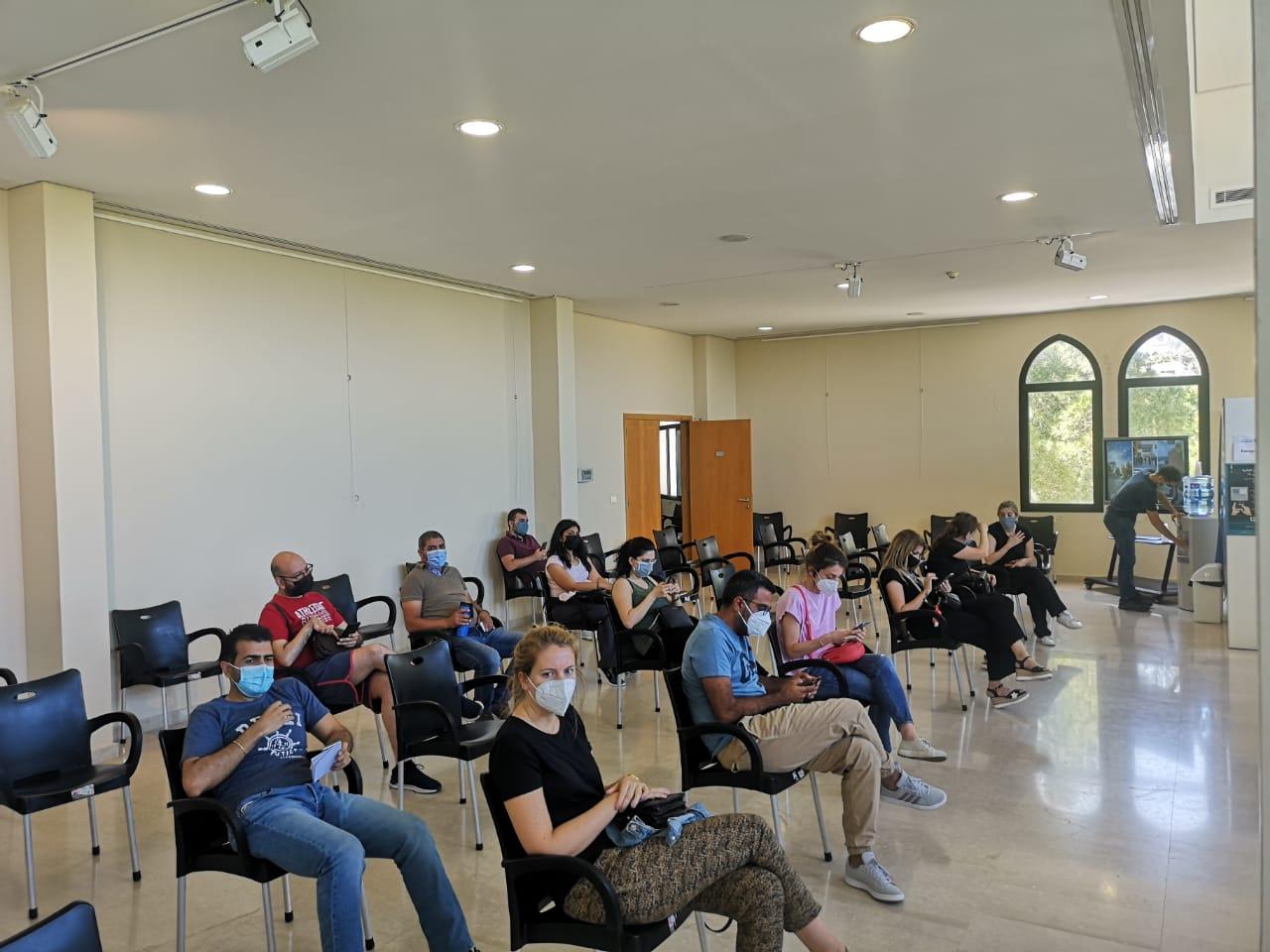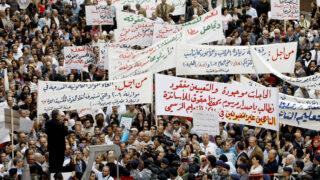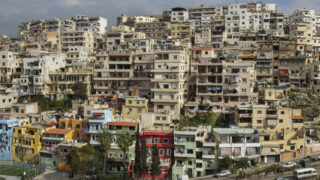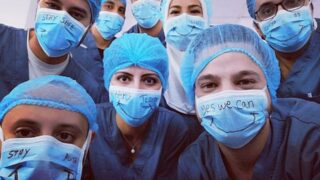
This publication has benefited from the support of the Rosa Luxemburg Foundation. This text may be reproduced in part or in full, provided the source is acknowledged.
Amidst Lebanon’s economic collapse, queues by fuel stations, pharmacies, and bakeries, amidst electric power cuts, lack of mazut, mistrust in the Lebanese state, and no sense of social safety and security, the Lebanese have still been receiving text messages from the Ministry of Public Health, fixing them Covid-19 vaccination appointments, and matching each with a vaccination centre and a time slot to receive their shot. This is quite surreal, and might even be the only positive message that Lebanese citizens receive today.
On February 14th, 2021, the Covid-19 vaccination campaign was rolled out in Rafiq Hariri University Hospital, which constituted an essential pillar in epidemic response in Lebanon. The first among medical personnel to receive the vaccine was the head of the ICU department at the hospital, while the famous Lebanese actor, Salah Tizani (Abou Salim) was the first to receive the vaccine among the elderly in Lebanon. Healthcare workers and people over 75 were the first groups to benefit from the vaccination campaign.
The Ministry of Public Health (MOPH) structured its national plan [1] on making vaccines optional and available to those who wished to receive them. They would be administered to individuals based on priority and age groups, or individuals with chronic illnesses and special health issues. The vaccines would be free and target all individuals residing on Lebanese territory, regardless of their nationality. In logistic terms, the vaccination process required registration on the e-platform, Impact, and filling out the necessary information. According to WHO [2], by August 15th, 2021, the number of people who registered on the platform had reached 2,306,304 people, 45.46 percent of whom were male and 54.54 percent were female.
Registration rates have been clearly fluctuating between provinces. According to MOPH figures, until August 16th [3], 2021, 53 percent of registered people were from Beirut Governorate, 42 percent from Nabatieh Governorate, 37 percent from Mount Lebanon Governorate, 31 percent from Beqaa Governorate, 25 percent from the South Governorate, 23 percent from the North Governorate, 17 percent from Baalbek-Hermel Governorate, and 15 percent from Akkar Governorate.
Many months into the vaccination campaign in Lebanon, WHO figures indicate that the number of shots administered in Lebanon by August 15th, 2021 had reached 2,204,566, 952,468 of which were administered to persons below 75, and 252,098 of which to persons over 75. Those were 1,226,090 first vaccinations and 977,344 second vaccinations.
In terms of vaccine types, Lebanon still uses Pfizer most, with 1,754,668 administered doses, as opposed to 317,945 AstraZeneca doses, 111,405 Sputnik V doses, and 13,096 Sinopharm doses.
Although the national vaccination plan had aimed to reached 70 percent of the Lebanese population throughout 2021-2022 (to prevent a viral spread and reduce the number of serious infections and deaths), the current figures indicate that Lebanon has not reached the required full vaccination coverage. By August 12th, 2021, the ratio of registered people to overall population had reached 33.2 percent, the ratio of first vaccinations (number of vaccinated people to number of individuals over 18) reached 27.1 percent, while the ratio of second vaccinations reached 22 percent.
As regards funding, and amidst the economic collapse and state resource deficits in Lebanon, the vaccination campaign has been funded by various actors: the World Bank (as the MOPH had booked two million and one hundred Pfizer doses as a loan from the World Bank) and WHO (providing technical support, subsidising purchases, and buying vaccine freezers), UNICEF (determining supply needs, evaluating the cold chain, purchases and maintenance, buying materials required for vaccination, be it injections and needles, contracting Arc en Ciel association for waste management, facilitating vaccine purchases and delivery through COVAX, and supporting the awareness campaign and community engagement), UNRWA and UNCHR Lebanon (providing logistical support to deliver vaccines to target refugees and displaced persons groups), and the Lebanon Collective of Global Pharmaceutical Companies, a drug importers union (providing vaccination supplies, allocating refrigerated trucks to transfer vaccines for the MOPH, and funding the call centre).
Evaluating the vaccination campaign in Lebanon
Scientific views on the Covid-19 vaccination campaign in Lebanon vary based on the socioeconomic complications that Lebanon has been living. El Jardali, the AUB K2P Centre director [4] affirms that “the Covid-19 vaccination campaign in Lebanon was off to a late start in comparison with other countries, and that, until today, the number of vaccinated people in Lebanon has remained less than the number needed in comparison with other countries.” El Jardali also notes that, in order to achieve herd immunity when facing the new variants and reduce the number of hospitalisations and serious cases, the vaccination rate in Lebanon must reach 80 percent before the end of 2021.
Registration rates vary between governorates: 53 percent were from Beirut Governorate, 42 percent from Nabatieh Governorate, 37 percent from Mount Lebanon Governorate, 31 percent from Beqaa Governorate, 25 percent from the South Governorate, 23 percent from the North Governorate, 17 percent from Baalbek-Hermel Governorate, and 15 percent from Akkar Governorate.
Reports issued by the centre [5] confirm that reaching 80 percent of vaccination coverage by the end of 2021 would flatten the curve in a noticeable manner, reduce peak infection levels and critical and serious cases per day by 37 percent, avoid more than 23 thousand serious medical conditions, and save more than two thousand people throughout this year.
El Jardali believes that the vaccination campaign could be sped up by visiting a number of accredited centres; improving vaccination campaign management; providing primary care centres with Covid-19 vaccines in order to ensure fair and equitable access to vaccines; enhancing vaccine supplies to distant and remote areas through mobile teams; facilitating the registration process of citizens wishing to receive the vaccine; reinforcing the arrival of vaccines to foreign workers and displaced persons; ensuring the continuity of a stable rather than an interrupted pace of vaccine provision; and responding to fake and misleading news.
El Jardali also notes that worldwide vaccine distribution has been flawed and unfair, whereby developed countries have noted a larger vaccination percentage than that recorded in developing countries. Social injustice in Lebanon is also reflected in vaccination figures, whereby vaccination rates in remote and distant areas remain smaller than those in major cities. For example, MOPH figures [6] note that the number of doses administered until August 17th, 2021 had reached 133,434 in Beqaa Governorate, 201,847 in the South Governorate, 230,621 in the North Governorate, 59,831 in Baalbek-Hermel Governorate, 150,669 in Nabatieh Governorate, as opposed to 352,908 doses administered in Beirut Governorate and 1,027,715 in Mount Lebanon Governorate, which has administered the highest number of doses so far.
In terms of vaccine types, Lebanon still uses Pfizer most, with 1,754,668 administered doses, as opposed to 317,945 AstraZeneca doses, 111,405 Sputnik V doses, and 13,096 Sinopharm doses.
On the other hand, Dr. Ali Mokdad, researcher at the Institute of Health Metrics and Evaluation (IHME) at Washington University [7], says that the pace of the vaccination campaign in Lebanon is slow due to the limited availability of the vaccines and some people’s hesitation to take it. IHME figures indicate that 72.7 percent of Lebanese people have been open to receive the Covid-19 vaccine, while rates in other states of the region have ranged between 46 percent in Afghanistan, 45 percent in Palestine, and 95 percent in the UAE.
According to IHME figures, the number of vaccinations with at least one dose in Lebanon would reach two and a half million by December 2021. He adds that Lebanese people generally preferred the Pfizer-BioNTech vaccine, which is activated through a Messenger RNA technique, as opposed to other vaccines, which has slowed down the pace of the vaccination campaign.
According to an interview carried out by the Lebanese Centre for Policy Studies [8], head of the national Covid-19 vaccination committee, Dr Abdel Rahman al-Bizri, thinks that the vaccination campaign isn’t slow-paced, but that vaccine quantity is limited. The problem, then, isn’t in the plan itself, but in the quantity of available vaccines, people’s hesitation to take the vaccine, and the challenges that some faced in using an e-platform.
In parallel, Pascale Salameh, professor of epidemiology at the Lebanese University [9], thinks that the vaccination campaign in Lebanon has been good when considering the country’s tough circumstances, and that a faster-paced vaccination campaign wasn’t possible. According to an academic study that a few Lebanese researchers [10] conducted and published in the scientific journal BMC Public Health in May 2021, Salameh notes increased hesitation rates in Lebanon towards vaccination. 40 percent of study participants refused vaccination: rates were higher among female participants as opposed to male participants, and among married individuals as opposed to single.
By August 12th, 2021, the ratio of registered people to overall population had reached 33.2 percent, the ratio of first vaccinations (number of vaccinated people to number of individuals over 18) reached 27.1 percent, while the ratio of second vaccinations reached 22 percent.
Social injustice in Lebanon is also reflected in vaccination figures: vaccination rates in remote and distant areas remain smaller than those in major cities. Notably, Mount Lebanon Governorate has administered the highest number of doses so far: 1,027,715 as opposed to 352,908 in Beirut Governorate.
Salameh believes that providing vaccines isn’t enough, but that fake and falsified news around the vaccine should be challenged, and people should be encouraged to take it by raising awareness in providing accurate scientific information. Salameh is critical of the dispute among the Lebanese around vaccine types: in many countries around the world people aren’t informed of the kind of vaccine they’re being administered – only health and scientific authorities can make that decision and determine the distribution of the available types of vaccine. On the other hand, Salameh believes that decision-making in Lebanon lacks soundness, as it is not based on local scientific studies or Lebanese data that could’ve been utilised to improve health conditions when facing the virus or improve the vaccination campaign to meet Lebanon’s particularities.
Vaccines and marginalised groups
A Human Rights Watch (HRW) report [11] published in April 2021 criticises the Lebanese government’s Covid-19 vaccination plan, which neglects marginalised groups, including refugees and immigrant workers. Although one out of three people in Lebanon is either a refugee or an immigrant, vaccination rates among these groups are still marginalised.
That is, a third of the population risks not benefiting from the vaccination plan. Syrian refugees interviewed by Human Rights Watch have expressed their fear of being arrested, detained, or even deported in case they registered online through the governmental platform, especially if their residence in Lebanon was illegal. The report notes that the Lebanese government has failed to provide accurate and updated information to Syrian and Palestinian refugees and immigrant workers, be it on the vaccine or the registration process, and has failed to reassure them that the vaccination campaign would be safe from immigration law enforcement actions. Palestinian refugees with whom HRW spoke had no knowledge of the vaccination and how eligible they were. They expressed fear of being discriminated against in light of the Lebanese government’s history of discrimination.
Head of the national Covid-19 vaccination thinks that the vaccination campaign isn’t slow-paced, but that vaccine quantity is limited. The problem isn’t in the plan itself, but in the quantity of available vaccines, people’s hesitation to take the vaccine, and the challenges that some faced in using an e-platform.
The number of doses administered to non-Lebanese individuals confirms the marginalisation that individuals of other nationalities suffer in Lebanon. According to WHO figures, and until August 15th, 2021, 2,045,838 doses were administered to Lebanese individuals as opposed to only 40,733 doses to Palestinians and 36,295 to Syrians.
Two vaccination campaign scandals
While many positive aspects have been noted throughout the vaccination campaign in Lebanon, including the organisation of vaccination marathons or a walk-in application, which requires no previous appointment to receive the vaccine, two vaccination scandals caused a media and social sensation.
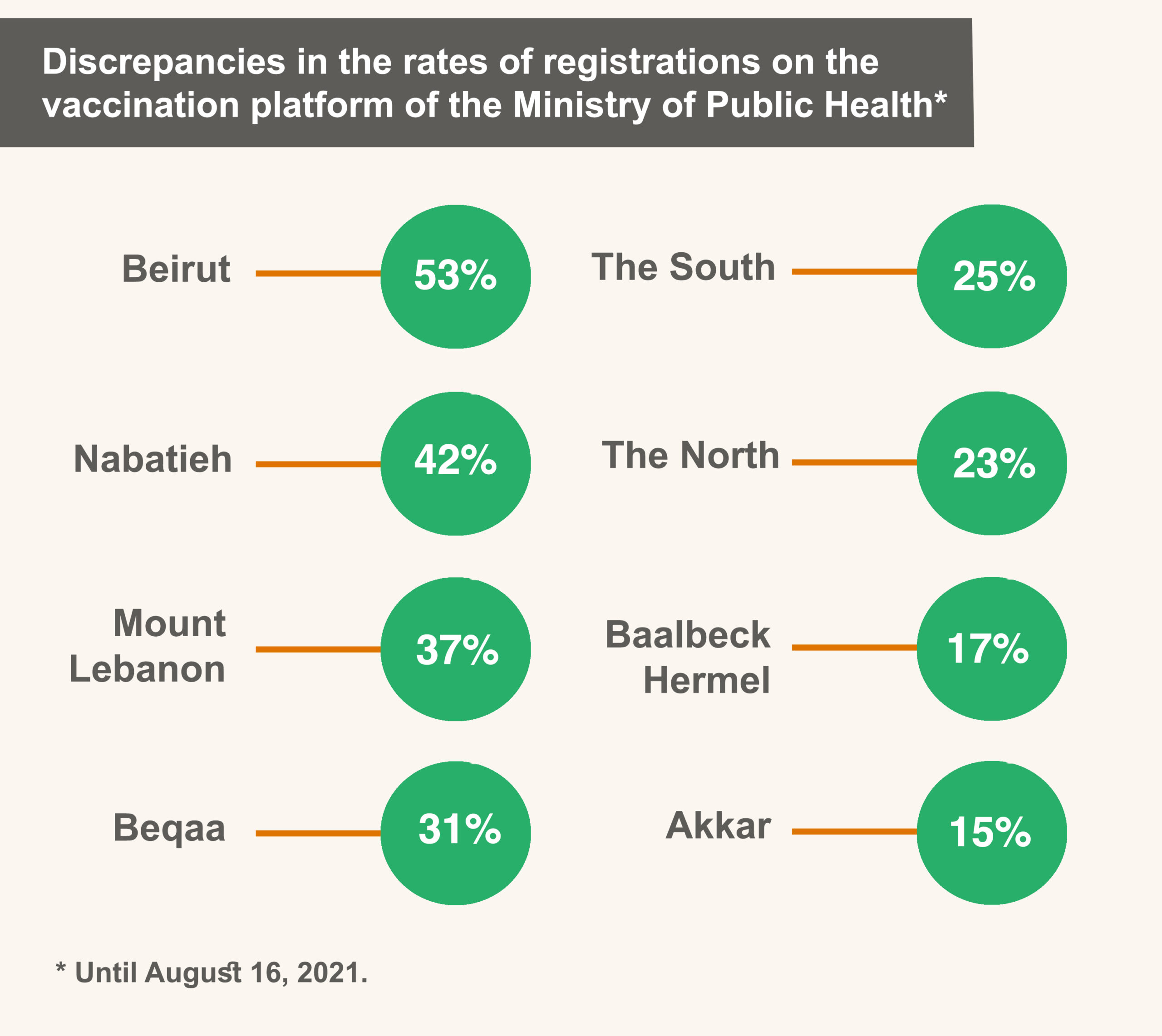
The first scandal took place on February 23rd, 2021, at the beginning of the vaccination campaign, when the secretary-general of the Chamber of Deputies confirmed that 16 members of parliament and four parliamentary officials had received the vaccine without the knowledge or approval of the national Covid-19 vaccination campaign committee in Lebanon. Head of the committee thus announced his resignation, but later went back on his decision. Then, the World Bank threatened to suspend the vaccination campaign and recorded the violation at hand. In parallel, the member in charge of ethics within the national vaccination committee resigned, hours after the MPs scandal took place. She explained that her resignation is related to the violations committed throughout the vaccination plan.
The number of doses administered to non-Lebanese individuals confirms the marginalisation that individuals of other nationalities suffer in Lebanon. According to WHO figures, and until August 15th, 2021, 2,045,838 doses were administered to Lebanese individuals as opposed to only 40,733 doses to Palestinians and 36,295 to Syrians
In mid-July 2021, another scandal broke out around adulterated vaccines in Batroun in northern Lebanon. It appeared that some Batroun residents had received, while bypassing the official vaccination platform, an adulterated vaccine composed of water and salt. In its issued statement, management of the Batroun Hospital denied that the vaccination had been carried out on hospital grounds. MOPH began an investigation into a former hospital nurse, who was accused of adulterating the vaccines. Head of the national Covid-19 vaccination committee reiterated that citizens must register for the vaccine through the official platform only, and affirmed the importance of raising awareness and approaching only those centres fixed by MOPH, where expertise and required safety standards are ensured.
Reporting side effects
Lebanese media did highlight the pharmacovigilance system reports issued by MOPH on the side effects of the vaccination campaign. Their findings could have been beneficial in encouraging people who were hesitant or scared to take the vaccine. Published in English and never translated into Arabic, these reports remained limited to scientists. The third report on the side effects of the vaccination campaign, which lasted between February 14th, 2021 and May 30th, 2021 [12], issued by the MOPH pharmacovigilance system and in cooperation with the Lebanese University, noted that 2,854 cases side effects had been reported, most of which through their e-platform. 63.4 percent of those were reported by females and 36.5 by males. The 18-44 age group reported most of these side effects. Side effects were categorised as 2,713 unserious cases, 94 cases requiring medical follow-up, 9 medically very important cases, and 49 serious cases.
Vaccines in Morocco: A Chinese Adventure
26-09-2021
The report showed that the most common symptoms reported after the vaccine was administered ranged between feeling an overall pain (45.8 percent), injection site pain (40.1 percent), fatigue (38.8 percent), experiencing shivers (34.8 percent), and headache (34.2 percent). Feeling physical and joint pain was one of the symptoms most shared by those administered the Pfizer-BioNTech vaccine, while fatigue was one of the most common symptoms among individuals administered other vaccines. The report considered that side effects recorded in Lebanon were similar to those observed internationally.
Will Lebanon be producing vaccines in the near future?
The caretake government’s Minister of Public Health and Minister of Industry visited Moscow in August 2021 in order to conclude an agreement between the Russia Investment Fund and Arwan Pharmaceutical Industries – Lebanon. The agreement concerns the manufacture of commercial quantities of both Sputnik V and Sputnik Lite, which would provide twenty-five million Sputnik V doses and a million Sputnik Lite doses, and would start in September 2021 and be carried out until the end of the year. The Minister of Public Health has thus authorised the company to import the primary substances needed to produce experimental doses of the two vaccines. According to a MOPH official statement, the Minister of Industry noted that this agreement was an industrial-sanitary-economic pact that puts Lebanon on the vaccine manufacturing map, guarantees around 700 million dollars in production and exports, and creates many job opportunities. However, the question remains around the extent to which this agreement could be applied, the possibility of manufacturing vaccines in Lebanon amidst its economic circumstances, lack of fuel, power cuts, refrigeration issues, and overall deteriorated infrastructure…
Covid-19 in Lebanon today
The number of Covid-19 infections in Lebanon has increased. A MOPH report [13] that monitored Covid-19 infections published on August 15th, 2021 recorded 1,515 new infections and 4 deaths. Added to past numbers, Covid-19 overall infections and deaths in Lebanon have reached 583,012 and 7,976, respectively.
Another report [14] published on August 5th, 2021 by IHME at Washington University links the increase in Covid-19 infection rates in Lebanon with the spread of the delta variant, increased movement of citizens, reduced rates of mask-wearing, and a slow-paced vaccination due to the limited quantity of vaccines. During the week of August 5th, Covid-19 infections constituted the third cause of death in Lebanon. It is expected that, by early December 2021, Lebanon’s death toll would reach 8,900 deaths caused by Covid-19 – that is, 960 new deaths in between August and December 2021. It is expected that hospitals and ICU departments would be overloaded due to an increased number of Covid-19 infections, a deteriorated hospital infrastructure as doctors and nurses immigrated abroad, lack of fuel, and scarce medicine and vaccines in Lebanese hospitals.
The content of this publication is the sole responsibility of Assafir Al-Arabi and Rosa Luxemburg Foundation cannot accept any liability for it.
Translated from Arabic by Yasmine Haj
Published in Assafir Al-Arabi on 26/08/2021
[1] The Covid-19 national plan – Ministry of Public Health. Minister-Presentation-Final-Jan28.pdf (moph.gov.lb)
[2] https://twitter.com/wholebanon?lang=en
[3] https://www.facebook.com/mophleb/photos/pcb.2676183972691257/2676181189358202/
[4] In an interview for Assafir al-Arabi with Fadi El Jardali, director of the K2P Centre at AUB.
[5] https://www.aub.edu.lb/k2p/Pages/K2PCOVID19.aspx
[6] COVID-19 Coronavirus Lebanon Cases (moph.gov.lb).
[7] In an interview for Assafir al-Arabi with IHME researcher at Washington University, Dr Ali Mokdad.
[8] https://www.lcps-lebanon.org
[9] In an interview for Assafir al-Arabi with Pascale Salameh, professor in epidemiology at the Lebanese University.
[10] https://pubmed.ncbi.nlm.nih.gov/34044790
[11] https://www.hrw.org/ar/news/2021/04/06/37838
[12]https://www.moph.gov.lb/userfiles/files/Quality%26Safety/PharmacovigilanceSystemInLebanon/Pharmacovigilance%20Executive%20Summary%20%20%233%2029%20June%202021.pdf
[13] https://www.facebook.com/mophleb/photos/a.1626551607654504/2675546282755026/
[14] http://www.healthdata.org/sites/default/files/covid_briefs/146_briefing_Lebanon.pdf

